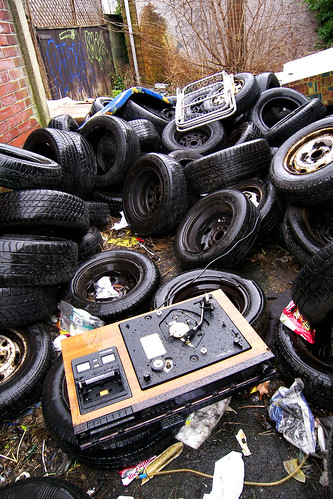A (Brief) History of Gleaning and Listing of Its Potential Errors

The acquisition method known as gleaning possesses roots as far back as the writing of Deuteronomy and Leviticus. Penny-pinching farmers, God decreed, must resist the urge to harvest the entirety of their fields. This remainder was to be left for the poor (or the widows, or the orphans, depending on which book you consult.)
I haven’t read the papers, but I assume the poor and downtrodden whooped and hollered over the news. Life is rarely easy when you can’t find things to eat. This is truth that has persisted despite all advances in technology. Sans food, you are a sack of slowly emaciating flesh. Food counts.
But gleaning as such was forced to evolve. With the invention and utilization of the dumpster, new opportunities for the glean-prone were ushered into existence. The practice known as dumpster diving refers to an act hardly conducive to diving; rather, considering the likelihood of sharp implements, glass, and unsavory objects in general, diving is likely the last thing one should consider when encountering a dumpster. The more common method could be called “dumpster plucking” and it is the one more frequently advocated, and for obvious reasons.
But gleaning and its dumpster-borne successors extend beyond a search for food. People tend of have a lot of property now, so much that a shitload more is thrown away now than was in the past. Coupled with the rapid advances in technology, with its engineered obsolesce and propensity to break down without notice, gleaning has evolved to a search for things in general. There is gold to be found that is non-edible. And most of it works just fine.
For instance, I encountered not too long ago an (ostensibly) undamaged JVC-ALFC record player. Barely visible underneath a pair of equally-dated external floppy disc drives, the device’s only visible damage was a large crack bisecting its plastic hood. It was, for all intents and purposes, perfectly functioning – and for a record collector lacking a machine to play said records on, a tremendous find.
A little background here, for those uninitiated into the word of the record player. There are, potentially, an unlimited number of pratfalls involved in finding a phonograph – and this is something owing to the machine’s somewhat fragile nature. Example: The central rotating mechanism of some record players is motor driven, and requires the use of what is called a “turntable belt” to function. Regular use of a record player often leads to a significant amount of wear-and-tear on a belt, warranting a replacement.
The more common post-glean repair required for a record player, however, involves what is arguably the device’s most important component – the needle. Known by enthusiasts as a stylus, the needle is what skims over a record surface, creating friction and sound. It’s a little soldier, and like bigger soldiers, sometimes the weight its responsibility wears it down. And it breaks.
The point is, you don’t know what you are dealing with when it comes to record players. Finding one resembles, in a sense, those stories of sailors who, so smitten with the songs of sirens, follow the melodies to the death.And as their ships sink or their brains are dashed out on the wave-soaked and craggy cliffs they think, “If only I had stayed away.”
And that exactly what happened with the aforementioned JVC-ALFC. It started with a realization that, somehow, over the course of the two dozen Manhattan blocks I had walked since picking it the machine up, that I had lost its platter pad. This, initially a minor annoyance, became one valued at roughly $20 when I was forced to replace the lost pad with (unbeknownst to me) DJ-grade slip mats.
Likewise, and slightly more expectedly, the player was missing its stylus. Quick fix: Picking one up off ebay for mad cheap. Subsequent prompt realization: It was also missing its photo cartridge, an essential component and where my purchased stylus was supposed to be inserted. Replaceable, the cartridge, sadly, costs more money that I was willing to pay for it. So, for now, Operation Rehabilitation is on a indefinite hiatus. – for my wallet’s sake.
The moral here could not be more clear. For the broke-ass, gleaning, when accompanied by an above-average exertion of financial resources, should be avoided. Fancy yourself a sailor and steer clear.







